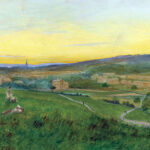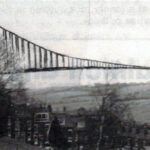16 March 1931: “Mary Ann Harvey (Lady Sadler) goes to an early grave because of war years spent in cold, draughty Buckingham House, Headingley Lane, Leeds”
Michael Sadleir. 1949. Michael Ernest Sadler 1861-1943. London: Constable. If you’re the rights-holder, please get in touch. Get it:
.Unedited excerpt
If an excerpt is used in the book, it will be shorter, edited and, where applicable, translated.
The house was handsomely austere and, in those happy days of fuel-plenty, could be kept warm even through the two months of snow and fog which were the prelude to 1913. But the demon of cold was biding his time and, when the 1914 War clamped down on England, seized his opportunity. Forty-one Headingley Lane could be as cold a house as any I have known. The main door, under a bleak pillared porch, gave on to a large vestibule. To the left of this was a full-size billiard room, used by MES as a picture-store. Its ornate cornice and hideous coloured glass served to emphasise the damp-stains from faulty lead-work, while its several old-fashioned radiators barely held their own against the chills creeping upward from the harsh dark soil. Beyond the vestibule lay the main hall, paved with marble slabs, open from floor to roof, and a playground for the four winds. So long as the elderly furnace, two or three anthracite stoves and all the sitting-room fires could be stoked to capacity, the hall was warm. But when restriction of supplies joined hands with patriotic self-denial, the lofty two-floor space became a core of bitter cold, against which no huddling over a study grate could other than temporarily contend. There is no doubt that the war-years spent in this fine house, designed for easy living and totally unsuited to a period of crisis, shortened my mother’s life. Circumstances demanded fewer and smaller fires, which her instinct for self-denial made fewer and smaller still. She lived in a muffle of woollies and scarves and coats, yet was never warm. Nobody’s fault and nothing to be done: but a sad pity, all the same.
Comment
Comment
Curious – 78 isn’t bad! She was an heiress who left £88,000 on her death (£4.75M in October 2022), so the 1910s shortage of domestic servants (to make and clean fires) probably wasn’t a factor.
Something to say? Get in touch
Similar
 26 May 1941: Headingley’s Shire Oak falls, legendary site of Anglo-Saxon local government between Aire and Wharfe
26 May 1941: Headingley’s Shire Oak falls, legendary site of Anglo-Saxon local government between Aire and Wharfe 30 May 1835: Alfred Austin, future poet laureate, “Banjo-Byron that twangs the strum-strum,” is born into rural splendour at Ashwood, 48 Headingley Lane, Leeds
30 May 1835: Alfred Austin, future poet laureate, “Banjo-Byron that twangs the strum-strum,” is born into rural splendour at Ashwood, 48 Headingley Lane, Leeds Reproduction through the blind benevolence of Leeds Other Paper (RIP).1 April 1979: Amid motorway mania in Leeds, West Yorkshire Council is today to reveal plans to link Chapeltown and Woodhouse by a ¼-mile suspension bridge across Meanwood Beck
Reproduction through the blind benevolence of Leeds Other Paper (RIP).1 April 1979: Amid motorway mania in Leeds, West Yorkshire Council is today to reveal plans to link Chapeltown and Woodhouse by a ¼-mile suspension bridge across Meanwood Beck
Comment
Comment
Via Remember LOP, a feed by Tony Harcup which pays tribute to some splendid local journalism, unimaginable today.
Council sources claim the scheme was a victim of the first wave of cuts imposed by Margaret Thatcher following her General Election victory a month later.
Something to say? Get in touch
Search
Donate
Music & books
Place-People-Play: Childcare (and the Kazookestra) on the Headingley/Weetwood borders next to Meanwood Park.
Music from and about Yorkshire by Leeds's Singing Organ-Grinder.



 Bluesky
Bluesky Extwitter
Extwitter